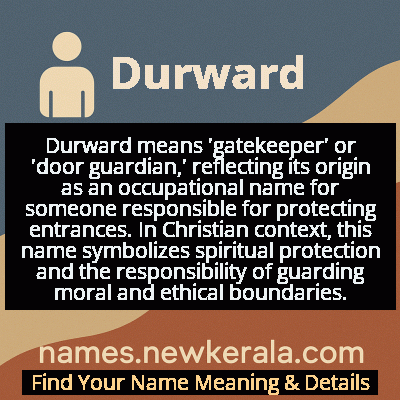Durward Name Meaning & Details
Origin, Popularity, Numerology Analysis & Name Meaning of Durward
Discover the origin, meaning, and cultural significance of the name DURWARD. Delve into its historical roots and explore the lasting impact it has had on communities and traditions.
Name
Durward
Gender
Male
Origin
Christian
Lucky Number
8
Meaning of the Name - Durward
Durward means 'gatekeeper' or 'door guardian,' reflecting its origin as an occupational name for someone responsible for protecting entrances. In Christian context, this name symbolizes spiritual protection and the responsibility of guarding moral and ethical boundaries.
Durward - Complete Numerology Analysis
Your Numerology Number
Based on Pythagorean Numerology System
Ruling Planet
Saturn
Positive Nature
Ambitious, efficient, realistic, and authoritative.
Negative Traits
Materialistic, stressed, confrontational, and can be overly ambitious.
Lucky Colours
Dark blue, black.
Lucky Days
Saturday.
Lucky Stones
Blue sapphire, amethyst.
Harmony Numbers
2, 4, 6.
Best Suited Professions
Business leaders, managers, financial services, law enforcement.
What People Like About You
Leadership, determination, organizational skills.
Famous People Named Durward
Durward Kirby
Television Personality
Co-host of 'Candid Camera' and prominent radio personality
Durward Hall
Politician
Served as U.S. Representative from Missouri for 12 years
Durward Knowles
Olympic Sailor
Won Olympic gold and bronze medals for the Bahamas
Durward Gorham
Football Player
Played professionally for the Chicago Cardinals
Name Variations & International Equivalents
Click on blue names to explore their detailed meanings. Gray names with will be available soon.
Cultural & Historical Significance
The name's enduring appeal lies in its combination of historical depth and meaningful symbolism. As societies evolved from feudal systems to modern structures, the concept of the gatekeeper transformed from a literal occupation to a metaphorical one, representing moral guardianship and spiritual protection. In Christian tradition, this connects to Jesus's description of himself as 'the gate' in John 10:9, and the broader theme of spiritual vigilance. The name's rarity in contemporary usage adds to its distinctive quality, making it appealing to parents seeking names with historical weight and Christian symbolism that haven't become overly common. Its continued presence in genealogical records and occasional modern usage demonstrates how traditional names with strong meanings can persist across generations.
Extended Personality Analysis
Individuals named Durward typically exhibit characteristics aligned with their name's meaning of 'gatekeeper' - they are often perceived as reliable, protective, and deeply responsible. These individuals tend to approach life with a serious demeanor and strong sense of duty, making them natural leaders and caretakers in both professional and personal contexts. Their protective nature extends beyond physical security to emotional and moral guardianship, often positioning them as the moral compass in their social circles. Durwards are generally methodical thinkers who prefer structure and predictability, and they excel in roles requiring vigilance and attention to detail. While sometimes appearing reserved or traditional to outsiders, those who know them well appreciate their steadfast loyalty and unwavering commitment.
In social settings, Durwards often serve as stabilizing forces, providing consistency and reliability that others can depend on. They tend to be excellent judges of character, reflecting the gatekeeper's role in discerning who should be admitted. Their communication style is typically direct and honest, valuing transparency over diplomacy. While not necessarily the most outgoing individuals, they form deep, lasting relationships based on mutual trust and respect. In challenging situations, Durwards demonstrate remarkable resilience and practical problem-solving skills, often taking charge when leadership is needed. Their combination of traditional values, protective instincts, and reliable nature makes them valued members of any community or organization, embodying the timeless qualities of guardianship and responsibility that their name represents.
Modern Usage & Popularity
In contemporary naming practices, Durward has become quite rare, typically ranking outside the top 1000 names in English-speaking countries and appearing only occasionally in birth records. Its usage is primarily concentrated among families with strong English or Scottish heritage, or those specifically seeking traditional names with historical significance and Christian meaning. The name experienced its peak popularity during the late 19th and early 20th centuries but declined significantly post-World War II as naming trends shifted toward more modern and less overtly occupational names. Today, Durward is more commonly encountered as a surname than a given name, though it maintains a niche appeal among parents looking for distinctive, meaningful names that haven't been widely adopted. Its current rarity gives it a vintage, almost antique quality that some modern parents find appealing, particularly those interested in reviving traditional names with strong etymological roots and Christian symbolism. The name's decline in popularity reflects broader trends away from occupational surnames as given names, though it continues to be used by those appreciating its historical depth and protective connotations.
Symbolic & Spiritual Meanings
Symbolically, Durward represents the profound concept of boundaries, protection, and the sacred responsibility of guardianship. The gatekeeper symbolism extends beyond physical doors to represent spiritual and emotional thresholds, embodying the idea of discernment in allowing passage between different states or realms. In Christian symbolism, this connects to numerous biblical references about watchmen, gatekeepers, and spiritual vigilance, representing the importance of guarding one's heart, mind, and community against harmful influences. The name also symbolizes transition and transformation, as gates represent points of entry and departure in life's journey. Metaphorically, Durward suggests someone who helps others navigate important transitions while maintaining necessary boundaries. Additionally, it embodies the concept of stewardship - the careful management and protection of something valuable, whether physical property, relationships, or spiritual principles. This rich symbolic tapestry makes Durward a name that conveys depth, responsibility, and the wisdom to know what to admit and what to exclude in various aspects of life.

